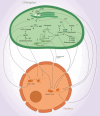Plastids in a Pinch: Coordinating Stress and Developmental Responses Through Retrograde Signalling
- PMID: 40474490
- PMCID: PMC12319301
- DOI: 10.1111/pce.15664
Plastids in a Pinch: Coordinating Stress and Developmental Responses Through Retrograde Signalling
Abstract
Plastids are crucial for fuelling and regulating plant growth and development. Photosynthesising chloroplasts provide energy for growth, while other plastids play additional key roles in various aspects of plant physiology. For function and development, plastids greatly depend on nucleus-encoded proteins, and they can modulate the synthesis of these proteins by sending retrograde signals to the nucleus. These signals communicate the developmental and operational status of the plastid, both of which are sensitive to the environment. Abiotic stressors such as drought, salinity, and suboptimal light and temperature conditions can induce changes in chloroplast metabolism, ultrastructure and cellular positioning. In response to specific environmental triggers, retrograde signals reprogramme nuclear gene expression to fine-tune plastid form and function, but also influence whole-plant morphology. Over the past years, the chloroplast responses to stress have become clearer. Various sources of retrograde signals, derived from plastid metabolism, plastid gene expression and altered photosynthetic redox balance, are now known to directly interfere with canonical signalling pathways. However, most of what is known about retrograde signalling originates from studies using artificial stressors, such as chemical treatments or genetic mutations, and its importance in natural environments is still poorly understood. This review highlights the understanding of plastid responses to the environment, as well as the impact generated downstream of retrograde signals, to better understand the role of plastids in abiotic stress resilience of flowering plants.
Keywords: abiotic stress; chloroplasts; environmental adaptation; gene expression regulation; genomes uncoupled; photosynthesis; plant development; retrograde signalling.
© 2025 The Author(s). Plant, Cell & Environment published by John Wiley & Sons Ltd.
Conflict of interest statement
The authors declare no conflicts of interest.
Figures



References
-
- Alawady, A. E. , and Grimm B.. 2005. “Tobacco Mg Protoporphyrin IX Methyltransferase Is Involved in Inverse Activation of Mg Porphyrin and Protoheme Synthesis.” Plant Journal 41: 282–290. - PubMed
Publication types
MeSH terms
LinkOut - more resources
Full Text Sources
Miscellaneous

